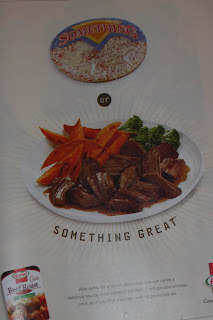
Really old people like to say the '50s and '60s were all about liberating women from the bondage of Domestic Homemakerism.
But after perusing this month's Real Simple, I'm not convinced the homemaking goddess is dead. That isn't to say I think homemaking is bad; I just think the ad messages we find quaint, antiquated and even manipulative still have a home in today's magazines.
What complements a happy marriage, great kids and a successful career? Miles of perfectly clean stemware, courtesy of my Electrolux dishwasher:


Pork and nail polish -- a match made in heaven. Or possibly Hell's Kitchen:
Be the big kahuna just for preheating your oven:
But you really should serve a delicious square meal, not a frozen disc:
If the pressure's on, there's always wacky Uncle Ben -- who may like to party, but appreciates the importance of a wholesome meal. I can almost hear his twang:
Long day? Reward yourself with Jell-O's low-calorie rice pudding, which comes in très chic flavours like cinnamon and crème brûlée: the dessert of queens!









4 comments:
Wow. If you randomly sorted these ads with images from the 1940s and 50s, photo aesthetics aside, it would be hard to tell which came from the liberated era.
If I can go out on a limb and offend everyone, maybe the reason ad messages haven't changed is that this is what people respond to... so "moms" and "homemakers" in their hearts still want recipes, and plays on unsatisfying husbands, and clever slogans about rice.
The underlying needs for sex, food and shelter haven't changed. Sex in advertising is still well and good. Why not food and shelter?
In an efficient marketplace, advertisers will put forth messages that get response. Methinks people are still responding.
Ben makes a great point, and I'd be tempted to expand on it, but I can't get past the copy on the Uncle Ben's ad: Does it *really* say, "...I aim to make a lot of healthy, wholesome and perfectly seasoned people"? Seasoned *people*? Just who is Ben serving, anyway? Cannibals?
Thanks for taking time to put all the images up - your post really makes the case. And, much as I wish it weren't so, Ben makes a good point - we may not know these people, but there must be someone who responds to these 1950s approaches.
Those, like us, who question it, may be too involved in and sophisticated with our views of marketing.. but what about the other 99% of the country? I've been in the marketing to women field for 7+years and continue to be surprised at how long this cultural evolution is taking.
Will we see similar ads in a women's mag in 5 years? Probably.
You can find equally sexist (aka. gender-stereotyped) ads in men's magazines.
The issue is much bigger than women's lib.
It's that advertising targets groups of people. Those groups are categorized by attributes (demographics, psychographics, etc). In other words, we operate off of stereotypes (on the whole). Why? Because it's convenient and effective (on the whole).
Not all women who read Real Simple are homemakers. Not all women who read Sports Illustrated are jocks. But if you've got a 'homemaker product' would it really make sense to buy space in SI?
Post a Comment